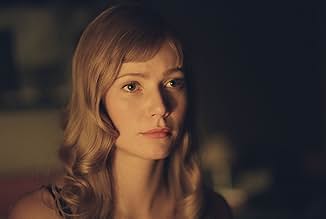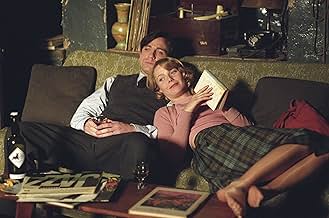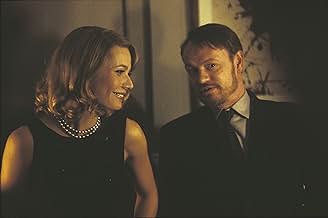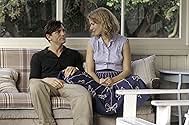CALIFICACIÓN DE IMDb
6.3/10
11 k
TU CALIFICACIÓN
La historia de la relación entre los poetas Ted Hughes y Sylvia Plath.La historia de la relación entre los poetas Ted Hughes y Sylvia Plath.La historia de la relación entre los poetas Ted Hughes y Sylvia Plath.
- Premios
- 1 premio ganado en total
- Dirección
- Guionista
- Todo el elenco y el equipo
- Producción, taquilla y más en IMDbPro
Opiniones destacadas
When I rented this movie, I thought it would be about Sylvia's entire life, or at least starting from her days at Smith College. I didn't realize that her marriage with Ted Hughes would be the entire storyline. I think this movie would've been better had they shown more about Plath's life BEFORE Ted Hughes. For people who don't really know much about Plath and her poetry, understanding her life before Hughes would've made the film much more substantial. The audience has to realize that Plath led a very, very hard mental life even before she met Hughes, and her ideas for her poetry and 'The Bell Jar' mostly originated from her bachelorette days. She never recovered from her depression as a young woman and it branched out still as she married Hughes. Without understanding Plath from the beginning hinders the audience from understanding Plath at all.
I feel like the movie only told half the story. Plath's mind was beautiful, colorful, and brilliant. It wasn't just about the jealousy, depression, and paranoia. Putting her works on the back burner really took away most of this movie. I would've liked to see more narration by Plath and giving us an insight into her mind, the way her unabridged journals do. However, I really enjoyed the dialogue of this movie; the lines were poetic and beautiful.
Unfortunately, I am still waiting for a better Sylvia Plath movie. I recommend people to read 'The Bell Jar' and 'Ariel' before or after seeing this movie though.
I feel like the movie only told half the story. Plath's mind was beautiful, colorful, and brilliant. It wasn't just about the jealousy, depression, and paranoia. Putting her works on the back burner really took away most of this movie. I would've liked to see more narration by Plath and giving us an insight into her mind, the way her unabridged journals do. However, I really enjoyed the dialogue of this movie; the lines were poetic and beautiful.
Unfortunately, I am still waiting for a better Sylvia Plath movie. I recommend people to read 'The Bell Jar' and 'Ariel' before or after seeing this movie though.
As a young woman, poetess Sylvia Plath meets the fiery Ted Hughes because of one of his poems catching her eye and deeply impressing her. So begins their life together that continues with marriage and the inevitable onset of domestication. As a woman this affects Sylvia more than it seems to affect Ted and she finds herself struggling to write as she balances home life with working as a teacher. Things are made worse by Ted, who has the first of many affairs with a student from Sylvia's class. As the pressures of family and children going to grow, so does Sylvia's mistrust of Ted and paranoia over his behaviour.
When a film is loudly disowned by the child of the subject you do have to approach it with a certain amount of caution and, although I'm not sure why Frieda Hughes took against it, I suspect it is because of the very event-based approach of this film. In a film that shows us how Sylvia was pushed down and had her talent smothered one way or another, it is ironic that the script does something similar by failing to let us understand her poetry, her character or her talent. Instead what we are treated to is a story that shows her being oppressed and beaten down. Now I accept that this is supposedly essentially true, but by ignoring her fame I imagine that this could be seen as just piling more on top of the lot she had while she was alive. It also has the effect of turning a biopic into a relationship melodrama that slowly plods along, pushing Plath down until the ending we know is coming. It is still reasonably interesting but I didn't feel that I learnt anything specific about Plath other than the fact that she was with a man that wasn't particularly good for her which puts her in the company of a lot of woman; the difference between her and them was her poetry but the film doesn't seem too bothered about this.
The upside of this is that Paltrow is best in the role when she is being downtrodden and oppressed; when she is asked to do something other than this then she seems less sure of her character and is less able at least depressed she seems to know what is required of her. Craig is as reliable as usual and does well even if his character is not exactly layered or that complex. The support is mostly pretty good, although I didn't understand what attracted Michael Gambon to such a small role, but the film pretty much belongs to Paltrow, who takes to her downtrodden well.
Overall this was an average film that plays out like a relationship melodrama and didn't do much to help me understand the character or talent of Plath other than showing me what happened within her relationship with Hughes. I can understand why her children objected to this simplification of their mother because personally I would not want to be remembered for my suffering if I had such talent. Paltrow and Craig are both good with the relationship material but the film should have been much better than it was.
When a film is loudly disowned by the child of the subject you do have to approach it with a certain amount of caution and, although I'm not sure why Frieda Hughes took against it, I suspect it is because of the very event-based approach of this film. In a film that shows us how Sylvia was pushed down and had her talent smothered one way or another, it is ironic that the script does something similar by failing to let us understand her poetry, her character or her talent. Instead what we are treated to is a story that shows her being oppressed and beaten down. Now I accept that this is supposedly essentially true, but by ignoring her fame I imagine that this could be seen as just piling more on top of the lot she had while she was alive. It also has the effect of turning a biopic into a relationship melodrama that slowly plods along, pushing Plath down until the ending we know is coming. It is still reasonably interesting but I didn't feel that I learnt anything specific about Plath other than the fact that she was with a man that wasn't particularly good for her which puts her in the company of a lot of woman; the difference between her and them was her poetry but the film doesn't seem too bothered about this.
The upside of this is that Paltrow is best in the role when she is being downtrodden and oppressed; when she is asked to do something other than this then she seems less sure of her character and is less able at least depressed she seems to know what is required of her. Craig is as reliable as usual and does well even if his character is not exactly layered or that complex. The support is mostly pretty good, although I didn't understand what attracted Michael Gambon to such a small role, but the film pretty much belongs to Paltrow, who takes to her downtrodden well.
Overall this was an average film that plays out like a relationship melodrama and didn't do much to help me understand the character or talent of Plath other than showing me what happened within her relationship with Hughes. I can understand why her children objected to this simplification of their mother because personally I would not want to be remembered for my suffering if I had such talent. Paltrow and Craig are both good with the relationship material but the film should have been much better than it was.
What is it about an artist dying young - particularly if it is at his or her own hands - that strikes such a deep chord in so many of us? Is it the fact that this rare and special person achieves a kind of mastery of fate at the last moment, a perfect conclusion to this messy business of life that we mere mortals can never hope to attain? Could it be that this early death is just one more instance of an artist taking the elements of raw reality and transforming them into something stylized, transcendent and meaningful for the rest of us to brood over and contemplate? When poet and novelist Sylvia Plath committed suicide in 1963, she became the archetype of the tortured artist - particularly for sensitive young people who came to romanticize her end and her suffering in ways that lifted her and her work to iconic status.
The biopic, entitled simply 'Sylvia,' gets the 'tortured' part pretty much right, but has considerably less success with the 'artist.'
The film focuses mainly on the tumultuous relationship between Plath and her husband of eight years, famed poet Ted Hughes. The story begins in 1956 with their love-at-first-sight meeting when they were both students at Cambridge University. The film moves quickly through the years, showing how, after a short period of relative marital bliss, Ted's philandering began to take its toll on the relationship. As portrayed in the movie, Sylvia, despite her notable talent, is a mass of neuroses and insecurities, always toiling in the shadows of her (initially at least) much more well known and commercially successful husband. But her feelings of inadequacy and jealousy over Ted's infidelities cannot, in and of themselves, entirely account for her paranoia, her outbursts of anger and her suicidal tendencies. Those resulted mainly from the clinical depression that tormented the woman from the time of her father's death early in her childhood to her own tragic end. The movie sidesteps the electroshock therapy Plath underwent at various times in her life (though it very subtly hints at them), yet the film still manages to convey just how great a victim she was of this disease she could not overcome.
Thanks to John Brownlow's rather singlemindedly depressing screenplay, there's a tremendous feeling of sadness hovering over the film. Director Christine Jeffs brings a raw intensity to many of the confrontation scenes involving the pain-wracked, benighted couple. As Sylvia and Ted, Gwyneth Paltrow and Daniel Craig give rich, moving and sensitive performances, and Michael Gambon leaves his mark as a sympathetic neighbor who tries but does not succeed at saving Sylvia.
If there is a flaw in 'Sylvia,' it is one common to films that attempt to portray the lives of artists, particularly writers. Although a scenarist can dramatize the details of an artist's life, it is virtually impossible for him to capture the richness and power of the art itself in the different medium of film. We never get the sense of how Sylvia either overcomes the difficulties of her life to succeed in her writing or how she uses those difficulties to enhance her art. What we do get is a few shots of Sylvia sitting in front of a typewriter, a comment or two about a book that has been or is soon to be published, a few references to critical reviews, and a smattering of voice-over recitations of Plath's poetry. What we don't get and what it is virtually impossible for film to capture is the essence of the writing itself. For this, one needs to return to the source material, the works that have lived on after the woman herself all these years. If the movie inspires new people to explore Sylvia Plath's writing, it will not have been in vain
The biopic, entitled simply 'Sylvia,' gets the 'tortured' part pretty much right, but has considerably less success with the 'artist.'
The film focuses mainly on the tumultuous relationship between Plath and her husband of eight years, famed poet Ted Hughes. The story begins in 1956 with their love-at-first-sight meeting when they were both students at Cambridge University. The film moves quickly through the years, showing how, after a short period of relative marital bliss, Ted's philandering began to take its toll on the relationship. As portrayed in the movie, Sylvia, despite her notable talent, is a mass of neuroses and insecurities, always toiling in the shadows of her (initially at least) much more well known and commercially successful husband. But her feelings of inadequacy and jealousy over Ted's infidelities cannot, in and of themselves, entirely account for her paranoia, her outbursts of anger and her suicidal tendencies. Those resulted mainly from the clinical depression that tormented the woman from the time of her father's death early in her childhood to her own tragic end. The movie sidesteps the electroshock therapy Plath underwent at various times in her life (though it very subtly hints at them), yet the film still manages to convey just how great a victim she was of this disease she could not overcome.
Thanks to John Brownlow's rather singlemindedly depressing screenplay, there's a tremendous feeling of sadness hovering over the film. Director Christine Jeffs brings a raw intensity to many of the confrontation scenes involving the pain-wracked, benighted couple. As Sylvia and Ted, Gwyneth Paltrow and Daniel Craig give rich, moving and sensitive performances, and Michael Gambon leaves his mark as a sympathetic neighbor who tries but does not succeed at saving Sylvia.
If there is a flaw in 'Sylvia,' it is one common to films that attempt to portray the lives of artists, particularly writers. Although a scenarist can dramatize the details of an artist's life, it is virtually impossible for him to capture the richness and power of the art itself in the different medium of film. We never get the sense of how Sylvia either overcomes the difficulties of her life to succeed in her writing or how she uses those difficulties to enhance her art. What we do get is a few shots of Sylvia sitting in front of a typewriter, a comment or two about a book that has been or is soon to be published, a few references to critical reviews, and a smattering of voice-over recitations of Plath's poetry. What we don't get and what it is virtually impossible for film to capture is the essence of the writing itself. For this, one needs to return to the source material, the works that have lived on after the woman herself all these years. If the movie inspires new people to explore Sylvia Plath's writing, it will not have been in vain
I am pretty familiar with Plath's story, and am also a keen fan of her work, which i think contributed to my hesitancy in seeing the film. I did not have high hopes for this film at all, and honestly, I have to say that I was pleasantly surprised.
My main criticisms:
I found it hard to get past the whole 'Oooh look it's Gwyneth Paltrow as Sylvia Plath'. Someone who isn't famous on a global scale would have been more credible.
The whole premise of the film hinges on the deep passionate relationship of Plath and Hughes, yet I never really felt convinced by it. The relationship came across as quite two dimensional, and even pretty one sided on the part of Paltrow/Plath. Instead of being portrayed as an emotionally fragile woman driven to the edge by Hughes' constant philandering and ultimate betrayal, Plath actually seemed to come across as being deeply insecure and neurotic, constantly suffering from extreme PMT, and overreacting every time she saw Hughes even talking to another woman, rather than having genuine reason to suspect his infidelity.
There were a couple of key dramatic moments (such as after they have made love for the first time, and when they are out in the boat together) that felt very hammy, so disrupted the momentum of the piece.
The score is just awful. Totally totally overwrought, over the top, too loud and too much of it. Plus, as Paltrow/Plath really starts to lose her mind there is an almost constant sound of howling wind in the backgroud. Again, OTT. Less definitely would have been more.
HOWEVER
Ok, I complained about Paltrow above, but she really did a great job. She really is a very talented actress, and it is a shame the whole celebrity thing gets in the way. She was particularly fine in the latter stages of the film, and the sad descent into loneliness and irreversible depression was very well judged.
Likewise, Daniel Craig was very enigmatic, although I wonder whether the one sidedness of the relationship as mentioned above may have come from him.
As a whole the film was very sympathetic, and showed how hard it must have been for Hughes to live with Plath. It doesn't justify his behaviour but rather tries to show an understanding. It also evokes a sense of a time when poets were considered important.
This film stayed with me for some days after watching it, and I would recommend it. It is somewhat uneven in pace and direction, but I think Christine Jeffs is a director with talent, although her inexperience showed. But above all, it renewed my interest in both Plath and Hughes.
7/10
My main criticisms:
I found it hard to get past the whole 'Oooh look it's Gwyneth Paltrow as Sylvia Plath'. Someone who isn't famous on a global scale would have been more credible.
The whole premise of the film hinges on the deep passionate relationship of Plath and Hughes, yet I never really felt convinced by it. The relationship came across as quite two dimensional, and even pretty one sided on the part of Paltrow/Plath. Instead of being portrayed as an emotionally fragile woman driven to the edge by Hughes' constant philandering and ultimate betrayal, Plath actually seemed to come across as being deeply insecure and neurotic, constantly suffering from extreme PMT, and overreacting every time she saw Hughes even talking to another woman, rather than having genuine reason to suspect his infidelity.
There were a couple of key dramatic moments (such as after they have made love for the first time, and when they are out in the boat together) that felt very hammy, so disrupted the momentum of the piece.
The score is just awful. Totally totally overwrought, over the top, too loud and too much of it. Plus, as Paltrow/Plath really starts to lose her mind there is an almost constant sound of howling wind in the backgroud. Again, OTT. Less definitely would have been more.
HOWEVER
Ok, I complained about Paltrow above, but she really did a great job. She really is a very talented actress, and it is a shame the whole celebrity thing gets in the way. She was particularly fine in the latter stages of the film, and the sad descent into loneliness and irreversible depression was very well judged.
Likewise, Daniel Craig was very enigmatic, although I wonder whether the one sidedness of the relationship as mentioned above may have come from him.
As a whole the film was very sympathetic, and showed how hard it must have been for Hughes to live with Plath. It doesn't justify his behaviour but rather tries to show an understanding. It also evokes a sense of a time when poets were considered important.
This film stayed with me for some days after watching it, and I would recommend it. It is somewhat uneven in pace and direction, but I think Christine Jeffs is a director with talent, although her inexperience showed. But above all, it renewed my interest in both Plath and Hughes.
7/10
It's 1956 Cambridge, England. American student Sylvia Plath (Gwyneth Paltrow) is dismissed by the high-minded poetry review. She is taken with fellow student Edward Ted Hughes (Daniel Craig)'s poems. They eventually get married. He has many female fans and she suspects his infidelity. They have two children. She struggles to write under successful Ted's overwhelming shadow. She falls into depression and eventually commits suicide in 1963.
It's a downbeat biopic that bothers on old-fashion melodrama. Paltrow is lovely but I figured Plath would be more fragile even before her breakdown. Daniel Craig has the prerequisite charisma. The movie is very flat. It is unable to elevate the material into something more dramatic. This is a long drawn out character study that isn't terribly interesting.
It's a downbeat biopic that bothers on old-fashion melodrama. Paltrow is lovely but I figured Plath would be more fragile even before her breakdown. Daniel Craig has the prerequisite charisma. The movie is very flat. It is unable to elevate the material into something more dramatic. This is a long drawn out character study that isn't terribly interesting.
¿Sabías que…?
- TriviaFrieda Hughes, Sylvia Plath's daughter and literary executor, didn't allow the producers to access to her mother's poetry. She also publicly denounced the project in a published poem of her own.
- ErroresWhen Ted and Sylvia are in bed together and she is discussing her suicide attempt, you can clearly see Daniel Craig's tattoo through the make up on his shoulder and Gwyneth Paltrow's hair net to which her wig is attached.
- Citas
Sylvia: [to Ted, after making love] We're not even two people. Even before we met, we were just these two halves, walking around with big gaping holes in the shape like the other person. And when we found each other we were finally whole. And then it was as if we couldn't stand being happy so we ripped ourselves in half again.
Selecciones populares
Inicia sesión para calificar y agrega a la lista de videos para obtener recomendaciones personalizadas
- How long is Sylvia?Con tecnología de Alexa
Detalles
- Fecha de lanzamiento
- País de origen
- Idioma
- También se conoce como
- Ted and Sylvia
- Locaciones de filmación
- Productoras
- Ver más créditos de la compañía en IMDbPro
Taquilla
- Presupuesto
- GBP 7,000,000 (estimado)
- Total en EE. UU. y Canadá
- USD 1,315,498
- Fin de semana de estreno en EE. UU. y Canadá
- USD 58,940
- 19 oct 2003
- Total a nivel mundial
- USD 2,917,393
- Tiempo de ejecución1 hora 50 minutos
- Color
- Mezcla de sonido
- Relación de aspecto
- 2.35 : 1
Contribuir a esta página
Sugiere una edición o agrega el contenido que falta




































